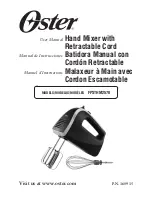
- 11 -
09/2019
Copyright © 2019, Fast ČR, a.s.
White bread
4 cups (600 g) of bread flour
3 tablespoons of dried milk
1½ teaspoons of salt
1½ tablespoons of sugar
1 teaspoon of bread improver
2 teaspoons of instant yeast
2 tablespoons of oil
1½ cups (375 ml) of water
additional bread flour for hand kneading
■
Use the kneading hook
A1
.
■
In the mixing bowl, mix the flour, dried milk, salt, sugar, bread improver and the
instant yeast.
■
Set the speed to 1–2 and slowly add water and oil into the dry mix. Leave it to knead
until a dough starts to form.
■
Move the dough on to a lightly floured rolling board and thoroughly knead by hand
until the dough is sufficiently fine and smooth.
Note:
At this stage, the dough should be very well kneaded so that
gluten is formed, which gives the dough the correct elasticity
and helps it to rise.
■
Place the dough into a large bowl and cover with plastic wrap. Allow it to rise in
a warm place for about 20 minutes or until the dough doubles in size.
■
Take the risen dough out of the bowl and knead once more on a lightly floured
rolling board.
■
Place the dough into a baking pan. Cover with plastic wrap and allow it rise in
a warm place for about 30–40 minutes or until the dough has risen sufficiently.
Remove the plastic wrap.
■
You can apply an egg glaze before baking. Bake in a preheated oven at 200 °C for
approximately 40–50 minutes or until the bread is golden in colour.
■
Allow the baked bread to cool down for 15 to 20 minutes and then remove it from
the baking pan. Allow the loaf to cool down completely before cutting it, to prevent
it from collapsing.
Egg glaze for bread dough
1 egg, lightly beaten
2–3 tablespoons of water
■
Mix both ingredients together until a smooth mixture is formed. Do not whip. If
necessary strain through a sieve. Brush the egg glaze on to the bread dough before
baking.
Focaccia (2–4 portions)
3 cups (450 g) of bread flour
1 teaspoon of salt
2 teaspoons of sugar
2 teaspoons of instant yeast
2 tablespoons of olive oil
1 cup (250 ml) of water
For glazing:
2 tablespoons of olive oil
1 tablespoon of coarse salt
2 tablespoons of black olives, sliced
■
Use the kneading hook
A1
.
■
In the mixing bowl, mix the flour, salt, sugar and yeast.
■
Set the speed to 1–2 and slowly add water and oil into the dry mix. Leave it to knead
until a dough starts to form.
■
Move the dough on to a lightly floured rolling board and thoroughly knead by hand
until a fine smooth dough forms.
■
Place the dough into a large bowl and cover with plastic wrap. Allow it to rise in
a warm place for about 20 minutes or until the dough doubles in size.
■
Take the risen dough out of the bowl and knead once more on a lightly floured
rolling board.
■
Place the dough into a lightly greased Teflon baking pan of dimensions 20 × 30 cm
and roll into the shape of the baking pan.
■
Lightly cover with plastic wrap and allow it rise in a warm place for about 20-
30 minutes or until the dough has risen a little. Remove the plastic wrap.
■
Brush the dough with olive oil and sprinkle on the coarse salt and sliced olives. •
Bake in a preheated oven at 200 °C for approximately 30-35 minutes or until the
focaccia bread is golden in colour.
■
After taking it out of the oven, allow it to cool down on a metal rack.
TECHNICAL SPECIFICATIONS
Rated voltage range .............................................................................................................220–240 V
Rated frequency........................................................................................................................50/60 Hz
Rated power input ......................................................................................................................1000 W
Electrical shock protection class ........................................................................................................II
Noise level
92 dB(A)
The declared noise emission level of the appliance is 92 dB(A), which represents a level
A of acoustic power with respect to a reference acoustic power of 1 pW.
EXPLANATION OF TECHNICAL TERMINOLOGY
Safety class for electrical shock protection:
Class II – Electrical shock protection is provided by double or heavy-duty
insulation.
Changes to text and technical parameters are reserved.
INSTRUCTIONS AND INFORMATION REGARDING THE
DISPOSAL OF USED PACKAGING MATERIALS
Dispose of used packaging material at a site designated for waste in your municipality.
DISPOSAL OF USED ELECTRICAL AND ELECTRONIC EQUIPMENT
This symbol on products or original documents means that used
electric or electronic products must not be added to ordinary
municipal waste. For proper disposal, renewal and recycling hand over
these appliances to determined collection points. Alternatively, in
some European Union states or other European countries you may
return your appliances to the local retailer when buying an equivalent
new appliance. Correct disposal of this product helps save valuable
natural resources and prevents potential negative effects on the
environment and human health, which could result from improper
waste disposal. Ask your local authorities or collection facility for more details. In
accordance with national regulations penalties may be imposed for the incorrect
disposal of this type of waste.
FOR BUSINESS ENTITIES IN EUROPEAN UNION STATES
If you want to dispose of electric or electronic appliances, ask your retailer or supplier
for the necessary information.
Disposal in other countries outside the European Union.
This symbol is valid in the European Union. If you wish to dispose of this product,
request the necessary information about the correct disposal method from the local
council or from your retailer.
This product meets all the basic requirements of EU directives related to
it.





























